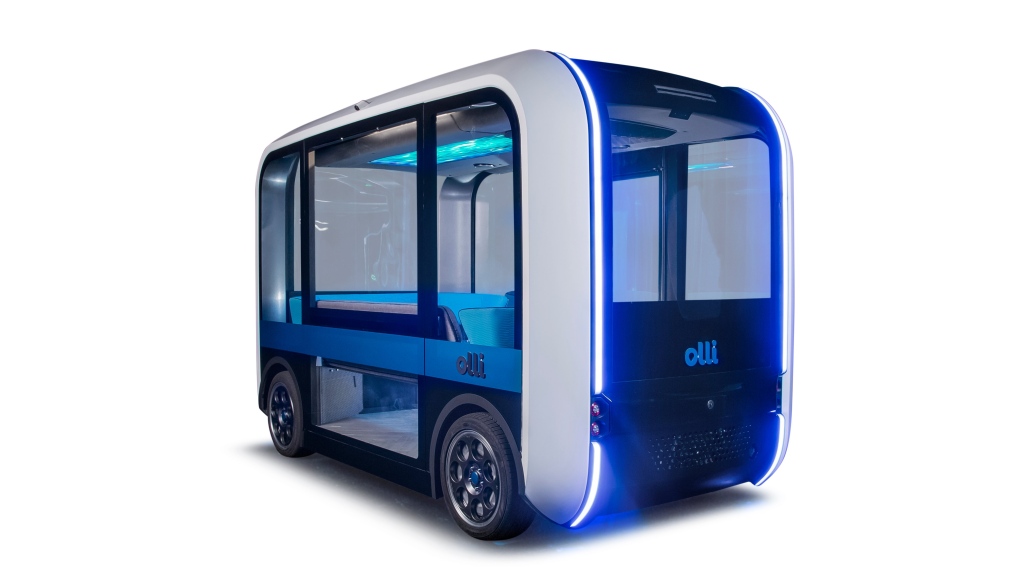Self-driving shuttle pilot project ends without giving a single ride
 A pilot self-driving shuttle is seen in this photograph shared by Toronto Mayor John Tory. (@JohnTory)
A pilot self-driving shuttle is seen in this photograph shared by Toronto Mayor John Tory. (@JohnTory)
An autonomous shuttle pilot project in Toronto that was supposed to connect one Scarborough neighbourhood to GO Transit has ended even before residents could ride the self-driving vehicle.
The city announced Friday the cancellation of the West Rouge Automated Shuttle program.
“The City, TTC and Metrolinx have jointly agreed to conclude the trial in Toronto due to several reasons that are expected to continue delaying service to the public past the February 28, 2022 planned end date,” the city said in a news release.
One of the reasons is that Local Motors, the company contracted to supply the self-driving shuttles, has recently ceased operations and can no longer provide technical and operational support, the city said. The company’s Olli 2.0 self-driving vehicle was going to be used for the project.
The pilot, the city said, was planned to be launched in spring 2021, but it got delayed because further evaluation of the shuttle’s performance was needed.
“Despite not offering service to the public, the city and its partners tested the automated shuttle service for two months in the fall of 2021 and gathered data about how automated vehicle technologies operate, their different requirements when compared to conventional transit vehicles, the current limitations of the technology and the range of solutions available in the market. The insights gained from the trial will support future decision-making and planning for automated vehicles in transit and the broader transportation system,” the city said.
The self-driving shuttle was supposed to connect residents of Scarborough’s West Rouge neighbourhood to Rouge Hill GO Station.
The vehicle had a seating capacity of eight passengers and was equipped with an accessibility ramp and a securement system for one wheelchair or mobility device.
It has sensors to analyze its surroundings and respond to road and traffic conditions. The shuttle has a maximum speed of 20 km/hr while operating autonomously but can travel up to 40 km/hr on manual mode.
An attendant would always be present on board in case they need to take over driving.
“The City, TTC and Metrolinx remain committed to finding innovative, accessible and sustainable transit solutions, including automated vehicle technology, to fulfill the future transportation needs of Torontonians,” the statement read.
The cancellation of the pilot project also comes after the Ministry of Transportation suspended its approval to operate the trial following an unrelated crash involving another self-driving shuttle in Whitby last month that left one man injured.
Durham police said the shuttle, which was not in service at the time, was in manual mode when it collided with a tree.
Following the crash, the shuttle service was suspended pending a full investigation into the incident.
CTVNews.ca Top Stories

Mark Carney reaches out to dozens of Liberal MPs ahead of potential leadership campaign
Mark Carney, the former Bank of Canada and Bank of England governor, is actively considering running in a potential Liberal party leadership race should Justin Trudeau resign, sources tell CTV News.
'I gave them a call, they didn't pick up': Canadian furniture store appears to have gone out of business
Canadian furniture company Wazo Furniture, which has locations in Toronto and Montreal, appears to have gone out of business. CTV News Toronto has been hearing from customers who were shocked to find out after paying in advance for orders over the past few months.
WATCH Woman critically injured in explosive Ottawa crash caught on camera
Dashcam footage sent to CTV News shows a vehicle travelling at a high rate of speed in the wrong direction before striking and damaging a hydro pole.
A year after his son overdosed, a Montreal father feels more prevention work is needed
New data shows opioid-related deaths and hospitalizations are down in Canada, but provincial data paints a different picture. In Quebec, drug related deaths jumped 30 per cent in the first half of 2024, according to the public health institute (INSPQ).
Rideau Canal Skateway opening 'looking very positive'
As the first cold snap of 2025 settles in across Ottawa, there is optimism that the Rideau Canal Skateway will be able to open soon.
Much of Canada is under a weather alert this weekend: here's what to know
From snow, to high winds, to extreme cold, much of Canada is under a severe weather alert this weekend. Here's what to expect in your region.
Jimmy Carter's funeral begins by tracing 100 years from rural Georgia to the world stage
Jimmy Carter 's extended public farewell began Saturday in Georgia, with the 39th U.S. president’s flag-draped casket tracing his long arc from the Depression-era South and family farming business to the pinnacle of American political power and decades as a global humanitarian.
'A really powerful day': Commemorating National Ribbon Skirt Day in Winnipeg
Dozens donned colourful fabrics and patterns Saturday in honour of the third-annual National Ribbon Skirt Day celebrated across the country.
Jeff Baena, writer, director and husband of Aubrey Plaza, dead at 47
Jeff Baena, a writer and director whose credits include 'Life After Beth' and 'The Little Hours,' has died, according to the Los Angeles County Medical Examiner.

































